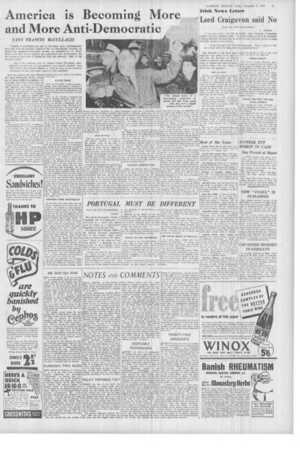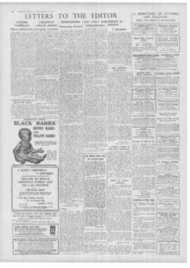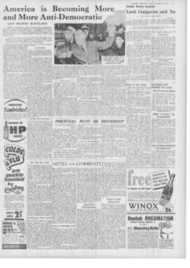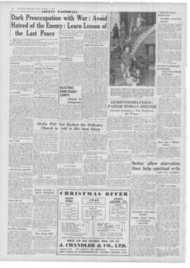Page 5, 6th December 1940
Page 5

Report an error
Noticed an error on this page?If you've noticed an error in this article please click here to report it.
Tags
Share
Related articles
Communism Is The Great Danger Of Civilisation
The Author Of "the Fairchild Family"
A Political Duel
Question. ,
The Triple Alliance
America is Becoming More and More Anti-Democratic
SAYS FRANCIS McCULLAGH
"America is anti-democratic, and is becoming more anti-dernocratie every day, with her excessive control of life, her interminable planning by experts, her enormous bureaucratic machine, her multiplication of official forms to be filled up in triplicate, the compulsions and subserviencies she has created at every turn of human life from the maternity clinic to the mortuary casket."
Such is the outspoken view of Captain Francis McCullagh, international journalist and war rorrespondent, in a special despatch from New York to the CATHOLIC HERALD, in which he sums up the American Presidential Election with small regard for both candidates.
As I was walking one night during the recent Presidential election along one of those sordid thoroughfares in East Side, New York, which seem to combine all that is worst in a Cantonese and a Milanese slum, though they run not a hundred yards from gorgeous avenues which give off enough light to make them visible from distant stars, I was suddenly smitten by the blast of a gigantic and authoritative voice which swept down a dark, silent, and apparently deserted side-street.
Surprise at the contrast between the strength of the voice and the absence of an audience, I turned up the side-street to investigate, and did not go far till I discovered the explanation of the riddle in the shape of a large red van parked outside a drug-store. This vehicle carried a powerful amplifier which emitted a roar that must have originated with some election orator thundering from somewhere in these United States.
Who on earth could he be? In emphatic tones he declared that he was the sole friend of the working man, who, 'without him, would be thrown to the wolves of Wall Street. " I am the Protector of the Poor. I am fighting for the Little Man. I am battling for the Weak. I never forget the Forgotten Man. Reject me, and you deprive your aged mother of her Old Age Pension, your little child of her Free Milk, yourself of your Non-Employment Pay."
This is not a quotation. I merely try to convey the impression made on me by the President's speeches. The same impression was made on many other people, one of them Mr. A. E. Smith, who spoke as follows, in his humorous way, of F. D. R's dictatorial voice: " You know, when I heard his voice., I said to myself: Who's talking? Is it Franklin D., or is it Adolf, or is it Benito, or is it Joe?' "
DULCET TONES Such was the burden of that tremendous message. For a split second I wondered if I had not by some miracle been carried back into the past, if I were not listening to Lloyd George in Limehouse or to Lenin in the Red Square.
Then, to my surprise, I recognised the voice of President Roosevelt, whom I had heard at Washington only a few weeks earlier, not through a loudspeaker, but at first hand and short range. But what a different voice that wasl The dulcet tones of a benevolent aristocrat to whom life has been good, who does not harbour a grudge against any living man, and who has not a single enemy in all the world, barring the two dictators (for he seems to regard Stalin as a democratic leader). He was inaugurating a Civil Airport near the capital, and though, with his customary eye for the dramatic, he had arranged for the whole military and naval air force of the United States to fly overhead so that the innumerable cameras should get his fine profile as he looked upwards (the best of his many poses) and so that he could get in an inimitable rapier thrust at Hitler, he had nothing to say of domestic enemies.
On the second occasion he was speaking from the Convention Halt in Philadelphia, and though he was undoubtedly surrounded there by the same well-groomed audience as I had seen around him on the Washington aerodrome, the audience gathered in front of that loudspeaker in that Bowery slum was the audience to which his words were directed, the audience which re-elected him. Owing to the darkness of the street, I had failed at first to see that crowd, and from first to last I never heard them, for they were speechless with enthusiasm. Not by a single handclap or a single whisper would they obscure that magnificent voice, one of the most melodious voices that ever spoke over the radio. Never perhaps was an audience so wrapt since the day when, standing on a snap-box at lIaparanda, Lenin told the frontier guard sent to stop him that their business was not with him but with the rich landlords who had deprived them of their land. The idea was so novel, so overwhelming, that those Russian soldiers were unable
even to applaud. But they took Lenin's advice. They moved silently south, hugging their loaded rifles.
SOLDIERS—THEIR POTENTIALITY
In that New York street there were also soldiers in uniform, for we have now conscription. As I looked at those soldiers I recalled the ominous fact that the Russian Revolution would probably not have come off were it not for the calling-up by the foolish Czar, at the urgent request of two foolish Premiers, one of them English, the other French, of sixteen million young men for whom there were no arms, no officers, no food, no barrack accommodation. There were others in uniform besides the soldiers, as I realised when I felt a friendly hand on my shoulder, and, looking round, saw a lift-boy from my super-luxe hotel, and several other hotel employees. They did not speak, but., turning up the lapels of their purple jackets, they showed me Roosevelt buttons, which the management did not allow them to display openly because, with one exception, every guest in the hotel was for Winkle. I was the exception : I was for neither of the candidates, being impartial, and seeing good and evil on both sides. Most of the crowd wore very shabby civilian dress. A large proportion wore workmen's overalls 'which were soiled and torn.
As I have just intimated, I am not going to denounce President Roosevelt as a Lenin or to hail Mr. Winkle as a General Franco. In 1933 President Roosevelt probably saved
America from red revolution by quietly carrying through a bloodless revolution, His great strength lies in his genuine sympathy for the poor. Even before he entered politics or intended to enter politics, he carried out personally in the slums of New York that charitable work which we associate with the name of St. Vincent de Paul. That charity should cover a multitude of defects, and, like the rest of us, the President is not without defects.
LOVE OF WAR
His most serious defect In my eyes at the present moment is probably his greatest virtue in the eyes of Englishmen, his love for war. There can be no doubt that he deliberately worked up the war hysteria which now rages in America, partly because he worships war, partly because he has a strong sympathy for England. and partly because he wishes to distract attention front the many feature.s of his New Deal which have not been a success.
They have failed because of a wrong diagnosis, but Mr. Willkie's diagnosis is still wronger. America is not on the right track. She is in the grip of the money power. She is anti-democratic, and is becoming more anti-democratic every day, with her excessive control of life, her interminable planning by experts, her enormous bureaucratic machine (one man in every five tieing now a Government functionary), her multiplication of official forms to be filled up in triplicate, the compulsions and subserviencies she has erected at every turn in human life from the maternity clinic to the mortuary casket. The only remedy is to scrap the Judaea
Puritanical system now in force here, and establish a Christian social order like the order established in Portugal by Dr. Salazar, but, of course, neither President Roosevelt nor Mr. Willkie would ever propose to do that. Mr. Willkic's plan is to return to the old state of things, without interfering with the social security measures enacted by his rival.
This, of course, is impossible, because if Mr. Willkie pays out in doles and bonuses and subsidies what Mr. Roosevelt has paid Out, he will have to bleed the rich as Mr. Roosevelt is bleeding them.
A majority of the voters felt sure that the Republican candidate could not keep his word, and therefore voted against him
last Tuesday. The President's plan is to continue the New Deal, but at the same time to benefit the moneyed classes who are behind Willkie by securing for them the Latin American and the Far Eastern markets, the former by enabling the British to annihilate Hitler and his allies, the latter by annihilating Japan, himself
JAPANESE-AMERICAN WAR
Unless the Japanese halt, a JapaneseAmerican war is certain during the coming year. To support this view, I could point to the many preparations that are being made here and in Honolulu, but lack of space prevents me from doing so. I might point, however, to the important fact that if America gives Japan another year, the Japanese Fleet will be very much stronger than it is, owing to war vessels under construction. The President thinks that if he wins such a war, American industrialists and exporters will benefit, but he may not win
It, and even if he does, the expenditure will be so great that inflation and a stump are inevitable at home, while the gains overseas may be small because of the fact that the Far East is nearly as mad on the subject of nationalism as Germany, that Chiang Kaislick is almost a Communist, and that Republican China may prefer to do business with a Republican Japan.
Mr. Roosevelt merely seeks to postpone the evil day which must sooner or later come on America because she is on the wrong lines in her national economy and her national life, and the result of naval triumphs abroad will be had for liberty at home. The present concentration of power in the hands of the President will become permanent, and the Constitution of the United States will be changed for the worse.
There are now four and a half million persons on the Federal pay-roll, according to the Department of Labour, but a much larger number is vitally interested in supporting Roosevelt for financial reasons. Speaking at Omaha on October 2R, Mr. Henry A. Wallace, the President's running mate, told the farmers that their subsidies would be discontinued not only if Roosevelt lost, but even if he won and found that they had voted
against. him, Under these circumstances, Roosevelt can run again in 1944 or nominate somebody to run for him, as President Calles of Mexico did, That savage half-caste is different, of course, from the cultured and kindly gentleman who at present occupies the White House. but the very gentleness of Mr. Roosevelt may enable him to break down those safeguards which Americans have set up around their freedom, and thus clear the way for a dictator as ruthless as Calles or Hitler.
blog comments powered by Disqus









